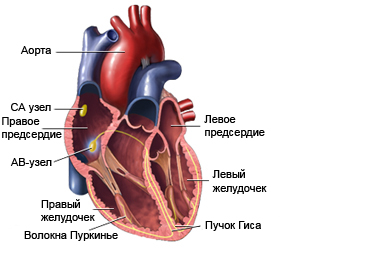Electrophysiological study – EFI
Description electrophysiological study
Electrical signals, arising near, support the work of the heart muscle, which pumps the blood in the body. When these signals encounter on its OBSTACLES, it can lead to serious health problems.
Electrophysiological study – test, in which special electrode is applied through the blood vessels to the heart. This electrode can detect cardiac currents or create electrical activity, that helps you find problems with the passage of electrical signals in the heart.

Reasons for electrophysiological studies
Electrophysiology studies carried out for the next:
- Find the cause of an abnormally slow heart rate (bradycardia);
- Find the source of abnormally fast heart rate (tachycardia);
- Provoke and diagnose heart arrhythmias (irregular heartbeat);
- Clarify availability Arrhythmia;
- To evaluate the risk of sudden death of the subject;
- Rate the symptoms of the following disorders, if the cause of their occurrence is not certain:
- Fatigue;
- Dizziness / fainting;
- Determine:
- Result antiarrhythmic therapy;
- The need to install a pacemaker;
- The necessity of implantation defiʙrilljatora kardiovertera;
- Need cryodestruction (the destruction of some heart cells by freezing).
Possible complications of electrophysiology study
Before, how to perform a study of the electrophysiology, you need to know about possible complications, which may include:
- Bleeding;
- Infection;
- The formation of blood clots;
- Damage to the blood vessels or heart;
- Abnormal heart rhythm;
- Heart attack.
The risk level is very individual. It can be associated with a specific type of arrhythmia and existing disease.
How is the electrophysiological study?
Preparation for the procedure
Follow your doctor's instructions.
You can eat a light meal the evening before surgery. Do not eat or drink anything after midnight.
Your doctor may prescribe:
- Blood tests;
- ECG – recording of the electrical activity of the heart;
- Chest X-ray.
Consult your doctor about the drugs taken. A week before surgery you may be asked to stop taking some medicines:
- Aspirin or other anti-inflammatory drugs;
- Blood thinners, such as clopidogrel or warfarin.
Anesthesia
It will put a local anesthetic. He numb the area the catheter. You will also receive a mild sedative through an IV, that will help you relax during the test.
Procedure electrophysiological study
You will be asked to lie on the examination table. The breast will be placed electrodes, that help control heart rate during the test. Thigh area, Neck, or just below the collarbone will be processed and purified antimicrobial solution. In the blood vessels in this area will be inserted into a thin electrical wire.
Wire through the blood vessel is let down to the heart. The doctor will be able to see the advancement of the catheter on the screen, by X-rays. The tip of the electrode can send electrical signals to the heart. The signals cause the heart to beat at different speeds. Your heart rate will be recorded, to a further study to find violations. The tip electrode may also register the electrical activity in certain areas of the heart muscle.
How long will the electrophysiological study?
The duration of the test depends on its objectives. The test may take 2-4 hour or more.
Electrophysiological study – Will it hurt?
You may feel some mild discomfort during the injection of the anesthetic. When the doctor cause arrhythmia, you can feel the heartbeat, shortness of breath, chest discomfort, or even lose consciousness. The medical team, usually, heart rate monitors, or may even apply shock, to restore the normal functioning of the heart. If you want to apply a shock, you get a sedative, and does not feel pain.
The average time of hospital stay
If the doctor did not appoint additional procedures, you will be able to return home after studies. Nonetheless, you may need to stay in hospital, If the study conducted additional procedures.
Care after the electrophysiological study
Care in a hospital
- They can be assigned to an electrocardiogram and blood tests;
- You need to lie on your back for some time. Down, where the catheter was inserted, maybe bandage, to prevent bleeding. We must follow the instructions of nurses;
- You need to rest, while sedative effect does not stop. Will monitor your heart rate and blood pressure. Besides, It will check availability of swelling or infection. If necessary, you need to take pain medicine;
- After resting for at least 4-6 hours, your doctor may allow you to return home or to stay for further treatment and observation.
Results of the study may be available immediately or in the next few days. Your doctor will tell, if you need further treatment.
Home Care
When you return home, Follow these steps:, to ensure the normal recovery:
- Do not lift heavy objects and do not have sex for 24 hours;
- Change the bandage around the area of the catheter in accordance with the instructions of the doctor;
- Take medicines as instructed;
- Ice can help reduce the discomfort at the site of catheter insertion. You can apply ice to 15-20 minutes every hour, within a few days after treatment;
- Be sure to follow your doctor's instructions.
Contact your doctor after electrophysiological study
After returning home, you need to see a doctor, If the following symptoms:
- Signs of infection, including fever and chills;
- Redness, edema, increased pain, bleeding, or any discharge from the catheter site;
- Cough, shortness of breath or chest pain;
- Leg freeze, turns white or blue, otekaet, It felt tingling;
- Discomfort in the jaw, Breast, neck, hand, or upper back;
- Dizziness and weakness.
